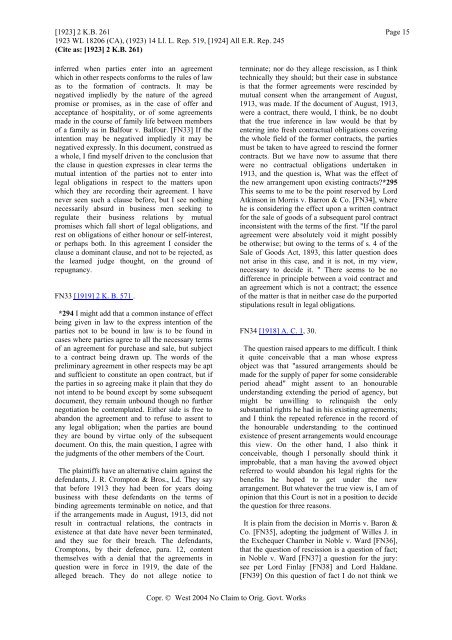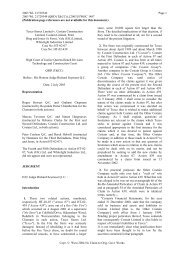Rose - Thomson Reuters
Rose - Thomson Reuters
Rose - Thomson Reuters
Create successful ePaper yourself
Turn your PDF publications into a flip-book with our unique Google optimized e-Paper software.
[1923] 2 K.B. 261 Page 151923 WL 18206 (CA), (1923) 14 Ll. L. Rep. 519, [1924] All E.R. Rep. 245(Cite as: [1923] 2 K.B. 261)inferred when parties enter into an agreementwhich in other respects conforms to the rules of lawas to the formation of contracts. It may benegatived impliedly by the nature of the agreedpromise or promises, as in the case of offer andacceptance of hospitality, or of some agreementsmade in the course of family life between membersof a family as in Balfour v. Balfour. [FN33] If theintention may be negatived impliedly it may benegatived expressly. In this document, construed asa whole, I find myself driven to the conclusion thatthe clause in question expresses in clear terms themutual intention of the parties not to enter intolegal obligations in respect to the matters uponwhich they are recording their agreement. I havenever seen such a clause before, but I see nothingnecessarily absurd in business men seeking toregulate their business relations by mutualpromises which fall short of legal obligations, andrest on obligations of either honour or self-interest,or perhaps both. In this agreement I consider theclause a dominant clause, and not to be rejected, asthe learned judge thought, on the ground ofrepugnancy.FN33 [1919] 2 K. B. 571 .*294 I might add that a common instance of effectbeing given in law to the express intention of theparties not to be bound in law is to be found incases where parties agree to all the necessary termsof an agreement for purchase and sale, but subjectto a contract being drawn up. The words of thepreliminary agreement in other respects may be aptand sufficient to constitute an open contract, but ifthe parties in so agreeing make it plain that they donot intend to be bound except by some subsequentdocument, they remain unbound though no furthernegotiation be contemplated. Either side is free toabandon the agreement and to refuse to assent toany legal obligation; when the parties are boundthey are bound by virtue only of the subsequentdocument. On this, the main question, I agree withthe judgments of the other members of the Court.The plaintiffs have an alternative claim against thedefendants, J. R. Crompton & Bros., Ld. They saythat before 1913 they had been for years doingbusiness with these defendants on the terms ofbinding agreements terminable on notice, and thatif the arrangements made in August, 1913, did notresult in contractual relations, the contracts inexistence at that date have never been terminated,and they sue for their breach. The defendants,Cromptons, by their defence, para. 12, contentthemselves with a denial that the agreements inquestion were in force in 1919, the date of thealleged breach. They do not allege notice toterminate; nor do they allege rescission, as I thinktechnically they should; but their case in substanceis that the former agreements were rescinded bymutual consent when the arrangement of August,1913, was made. If the document of August, 1913,were a contract, there would, I think, be no doubtthat the true inference in law would be that byentering into fresh contractual obligations coveringthe whole field of the former contracts, the partiesmust be taken to have agreed to rescind the formercontracts. But we have now to assume that therewere no contractual obligations undertaken in1913, and the question is, What was the effect ofthe new arrangement upon existing contracts?*295This seems to me to be the point reserved by LordAtkinson in Morris v. Barron & Co. [FN34], wherehe is considering the effect upon a written contractfor the sale of goods of a subsequent parol contractinconsistent with the terms of the first. "If the parolagreement were absolutely void it might possiblybe otherwise; but owing to the terms of s. 4 of theSale of Goods Act, 1893, this latter question doesnot arise in this case, and it is not, in my view,necessary to decide it. " There seems to be nodifference in principle between a void contract andan agreement which is not a contract; the essenceof the matter is that in neither case do the purportedstipulations result in legal obligations.FN34 [1918] A. C. 1, 30.The question raised appears to me difficult. I thinkit quite conceivable that a man whose expressobject was that "assured arrangements should bemade for the supply of paper for some considerableperiod ahead" might assent to an honourableunderstanding extending the period of agency, butmight be unwilling to relinquish the onlysubstantial rights he had in his existing agreements;and I think the repeated reference in the record ofthe honourable understanding to the continuedexistence of present arrangements would encouragethis view. On the other hand, I also think itconceivable, though I personally should think itimprobable, that a man having the avowed objectreferred to would abandon his legal rights for thebenefits he hoped to get under the newarrangement. But whatever the true view is, I am ofopinion that this Court is not in a position to decidethe question for three reasons.It is plain from the decision in Morris v. Baron &Co. [FN35], adopting the judgment of Willes J. inthe Exchequer Chamber in Noble v. Ward [FN36],that the question of rescission is a question of fact;in Noble v. Ward [FN37] a question for the jury:see per Lord Finlay [FN38] and Lord Haldane.[FN39] On this question of fact I do not think weCopr. © West 2004 No Claim to Orig. Govt. Works
















